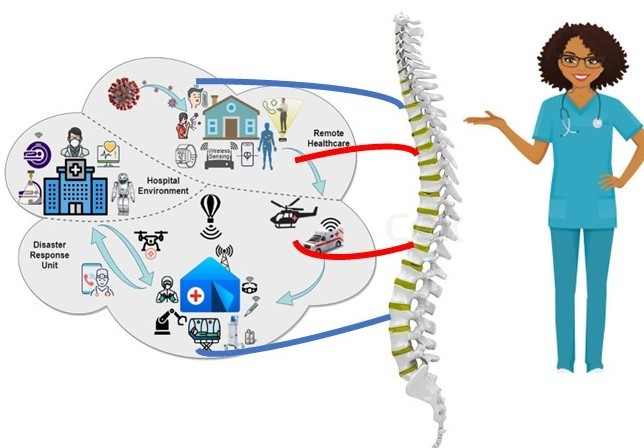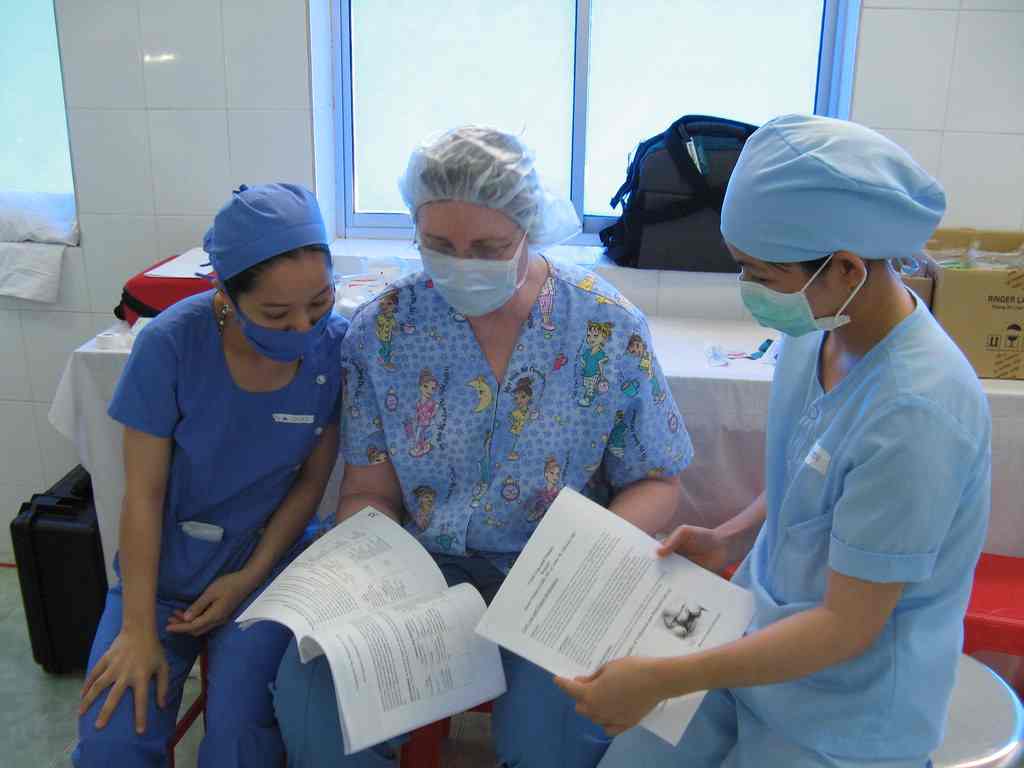Nurses are the backbone of healthcare systems
Published 03-05-2024
17458

Nurses are the backbone of healthcare systems
There were about 27.9 million nurses globally in 2020 according to the World Health Organization, and 3 million in the United States alone. This implies that nurses are the backbone of healthcare systems not only in the United States but also globally, and is by far the biggest occupational group in the healthcare industry, making up approximately 60 percent of the health professions.
Nonetheless, the shortage of nursing staff still persists, especially given the rise in patient populations that require more care. This shortage, according to the International Council of Nurses (ICN), is a global health emergency that has to be overcome in order to prevent heavy-workload-related burnout, stress, work absences and strikes that are perilous to healthcare and are common among nursing workforces globally.
Despite the aforementioned challenges, nursing has been regarded as the most trusted profession in America for more than 20 years now, since nursing professionals play the important roles of caring for patients and healthcare administration. In as much as nurses have long provided high quality care to the public, it has taken years of organizing, lobbying, and notably, academic advancement for the profession for it to acquire professional respect both inter- and intra-professionally within the clinical fraternity.
Why are nurses important in healthcare?
It is important to explore the roles or duties discharged by nurses in order to understand the importance of nursing professionals in the healthcare industry. These roles and/or duties can be explored in terms of the therapeutic alliances that they establish with patients as well as how they work with other health workers.
Nurses spend a lot of time with patients
A study conducted and published by Westbrook et al in 2011 found that nurse spend about 3.1 hours, in the typical 8.5 hour shift, with patients. A more recent study sought to determine the time spent by time intensive care patients with practitioners. It was determined that while a mere 13 percent of this time was spent with physicians, a notable 86 percent was spent with nurses. The time that intensive care patients spent with nurses was even greater for overnight hospital stays.
Patient advocacy as part of nursing practice
As mentioned above, patients spent most of their time with nurses. As such, they get to understand the needs, preferences, concerns, health habits and behaviors of their patients. This makes them better positioned to advocate for them in terms of improved health care.
Besides, advocacy is an important part of nursing practice, with the American Nurses Association (ANA) Code of Ethics requiring nurses to be active in the promotion, advocacy and protection of patient health, safety and rights.
According to the ANA, nurses’ advocacy roles can range from assisting in the coordination of care with other providers to ensuring that informed consent has been granted by patients prior to procedures, among others.
Patient education as a key aspect of nursing practice
Nursing practice is not limited to administering treatments or dispensing medications. According to Arkansas State University, nursing professionals are teaching patients on the management and prevention of medical conditions. Nurses spent a lot of their energy and time educating patients to: understand the procedures performed on them; medication prescribed (and their side effects); stressing the significance of good hygiene and proper nutrition, and; describing how the facility functions (in case of follow-ups). In so doing, the nurses enable patients to be in control of their care.
Nurses’ roles in monitoring the health of patients
Nurses’ role in monitoring the health of patients is perhaps the most significant one and, a discussion about nurse’ role in the current complex healthcare setting that is devoid of this critical role is meaningless! In their role of being in the front lines of healthcare, nurses monitor patient conditions at all times.
Nursing professionals enjoy greater autonomy than presumed!
Nursing autonomy implies that nurses can discharge their duties of caring for patients without necessarily needing the approval from other healthcare professionals, such as physicians. This means that nurses should be competent in terms of knowledge, skills and training.
This is not the first time you are coming across the concept of autonomy. You have probably read about it vis-à-vis the nursing profession, particularly from the perspective of how nurses currently enjoy autonomy to a greater extent compared to the past.
In her article in NursingProcess.org, Darby Faubion describes what this implies exactly. According to Faubion, nurses, particularly in the context of hospital admissions (stays), are usually the ones that identify an issue. In as much as the standard operating procedure is to notify the attending physician, there are instances where nursing professionals are required to promptly take action to prevent further deterioration of patients, without physician’s orders.
In some instances, physicians may outline cases that require nurses to take action without necessarily seeking the physician’s permission as part of standing operating procedure. When hypoxia worsens, for instance, a nurse does not need to consult a physician to initiate an oxygen therapy as time spent by calling for approval or assistance from physicians can lead to severe harm or patient’s death.
Oxygen therapy, although perceived as considered a procedure requiring a prescription, can be performed by nurses in emergency situations without the physician’s order. Majority of providers, therefore, have standard operating procedures that permit nurses to initiate oxygen therapy during emergencies, after which they will obtain physician’s order later.
In light of this, nurses should have a comprehensive understanding of practice since nurses are the backbone of healthcare systems, alongside trusting partnerships with not only the physicians but also the other multidisciplinary team members. This underscores the significance of NURSING CASE STUDIES as an active learning strategy in nursing. Nursing case studies leverage on material learnt in class and makes students to have a comprehensive understanding of class content.
But first …
What are nursing case studies?
A case study does not have an explicit description or definition; that is according to Heale and Twycross (2017). Yet, case studies are among the most common research approaches employed in life and social sciences. Heale and Twycross (2017), however, present a simple definition of case study, describing is as an comprehensive research/study into a unit, individual or a group of individuals with the objective of generalizing the findings over many other units.
A case study has also been defined as a comprehensive, systematic evaluation of a unit or person, group or community in which researchers perform an in-depth, multi-faceted analysis of data linked to various variables (which are often complex issues) in their real-life settings.
Case study approach as an active learning methodology in nursing
The use of case studies as an active learning approach is supported by a broad range of literature. In her article in the renowned peer-reviewed “Journal for Nurses in Staff Development,” Sherri M. Sprang highlights various benefits of using the active, learner-centered strategy of case studies in nursing education in terms of shaping student behaviors and thoughts that are critical to the mastery of the nursing process.
Case studies, according to Sherri M. Sprang, equip students with the right tools for enhancing their reflective and critical thinking, problem solving and decision-making as well as their grasp of particular disease processes.
It is a move away from the traditional teacher-centered learning to a rather learner-centered one in that the case study approach;
Depict realistic situations
According to Sherri M. Sprang, realistic situations are often portrayed in case studies with the objective of enabling discussions, enhancing students’ decision-making skills, encourage them to attain practical knowledge and apply previous knowledge, and improving their problem-solving skills. Through case studies, nurses and their student counterparts develop problem-solving and independent thought abilities by conforming theory with practice.
Enable the understanding of understand difficult or new material
For nurses and student nurses, a case study is advantageous in that they enable them grasp new or difficult material. An excellent example found in literature is when Sandstrom (2006) used Benner's theory of Novice to Expert in a bid to improve the understanding of chronic illnesses among students. The case study approach enabled the instructor to influence student nurses’ clinical practice in a positive manner by engaging them to learn and understand the complexities of disease processes.
Improves students’ critical thinking skills
Case study methods, such as continuing or unfolding case study method, allows students to fully understand the critical case principles prior to being provided with other information. With unfolding case studies, a building block style is used which, in essence, resembles the real-world nursing practice. The complexity of problems increases in this approach, hence honing students’ critical-thinking skills as their thought processes are challenged. Simply put, case studies guide students to methodically process data into relevant information.
Enhances student-instructor interactions
Case studies enhances student-student and students-instructor interactions, thus creating a collaborative approach to problem-solving. With instructor guidance, case study approach improves students’ problem-solving skills in that it enables them to not only synthesize knowledge but also apply it along with nursing theory. It also fortifies students’ critical thinking processes since instructors are there to question, guide and refocus them on problem resolution.
Assist students develop clinical judgment via reflective and critical thinking
Case studies are often employed in class to enable students develop the appropriate tools necessary for reflective and critical thinking when faced with problems in practice. Students tend to hone their critical thinking and reasoning skills as well as thinking strategies when clinical-based problems are used. Besides, the delivery of efficient, high-quality, patient-centered care needs the capability to think critically and integrate information in the clinical setting when faced with challenging situations. Problem-solving and decision-making skills are also improved when improving critical and reflective thinking.
Are you studying to be a nurse?
Now that we know that nurses are the backbone of healthcare systems, are you passionate about helping people and their families whether it is in the emergency room or outside the hospital? People that are passionate about the nursing profession are often those that care about the wellbeing of others, helping others and having a positive impact on lives.
If you are one of these passionate people and studying (or are about to study) nursing, prepare to take on difficult nursing papers, essays, papers, research, assignments and case studies. You may have to consider using nursing case study help in one instance or another during your nursing studies since there comes a time when you may need help with support and guidance from professionals that are experts in the field.
Rest assured that the profession has many specialties due to the nature of care provided to patients presenting with different problems. As such, each patient has unique needs and may require different nursing services from the next. Therefore, one ought to be wary of the various specialties before choosing as a profession.
Whichever the specialty a student chooses, they have to learn the various nursing skills and competencies. Whereas student can learn using various approaches, a nursing case study has been determined to be not only an active learning strategy but also an excellent technique that enables swift acquisition of skills and knowledge regarding a certain medical or nursing issue.
Alternatively, students aiming for splendid performance may seek for help with nursing case studies. Such nursing case study help services can be particularly helpful to student nurses that are unable to perform an in-depth research for their case study due to reasons such as time constraints and other life commitments.
A service like Literary Owls, for instance, provides professional nursing essay advisory service for student that are unable to write their essays or meet assignment deadlines due to unavoidable circumstances. For help with essays, one has to perform a simple internet search, choose Literary Owls’ nursing essay advisory service from the search results.
Literary Owls’ experts (fondly referred to as night owls) guarantees nursing papers, assignments and essays that are free of errors and plagiarism, and custom-written as per the requirements availed.
Nursing case studies and the nursing process steps
From the preceding, a nursing case study is aimed at equipping students with the right tools for enhancing their reflective and critical thinking, problem solving and decision-making as well as their grasp of particular disease processes.
These are especially relevant in the 5 nursing process functions of assessment, diagnosis, planning, implementation, and evaluation, all of which a student must follow to ensure that critical nursing care is provided.
Assessment: assessing the patient
Being the first step of the nursing process, assessment requires topnotch critical thinking skills in the collection of objective (measurable data like vital signs etc.) and subjective (verbal statements by patients/carers) data. Critical thinking skills important assessment, hence the need to hone them using nursing case studies.
Diagnosis: determining the condition of the patient
This is where clinical judgement is used to make a nursing diagnosis that will help in care planning and implementation. According to North American Nursing Diagnosis Association (NANDA), diagnosis is described as a clinical judgement made by nursing professionals regarding the responses to the potential or actual issues affecting patients and their families as well as communities. Depending on patient-centered outcomes, diagnosis is critical in prioritizing care plans.
Planning: developing a plan for appropriate patient care
In this stage, a nurse develops the goals and outcomes that directly shape the care of patients based on evidence-based practice (EBP) recommendations. The goals should be SMART i.e. Specific, Measurable, Attainable, Realistic and Timely. Care plans are important for goal-setting and not only improve documentation and communication but also enhance care continuity and reimbursement.
Implementation: actualizing the plan
Actual nursing interventions are carried out in this stage. The plans developed in the planning stage are put into action in accordance to the EBP guidelines.
Evaluation: assessing the treatment outcomes
This is the last stage of the nursing process and involves reassessment of the interventions to determine if the desired outcomes have been attained. If not, a new care plan may have to be developed based on the new objective and subjective data obtained.
Main topics covered in nursing case studies
As stated earlier, nursing case studies are valuable tools that help you build on your critical thinking skills and integrate knowledge into real-world scenarios. It is for this reason that we have compiled a list of the main topics that are often covered in nursing case studies as you prepare for your essays, assignments and research papers that you will encounter in the course of you nursing studies.
Below are some of the topics that will likely be covered in your nursing case study essays or assignments;
Anatomy and physiology
For a nurse to perform a comprehensive assessment of a patient, they should have a thorough understanding of the structure and function of all the organs in the human body. A student nurse will likely encounter case studies that require a deep knowledge of how membranes, cells and tissues that make up the human body as well as how the major systems work in a healthy human.
Nursing foundations
Nursing case studies will likely test students’ understanding of the fundamentals of nursing such as assessment, diagnosis, care planning and interventions. These are the very basic procedures and principles required of the nursing professionals capable of giving patients comprehensive care.
Community health
Nurses, like other health care professionals, are advocates for promotion and protection of the population health through efforts such as encouraging healthy lifestyles. As such, student nurses are likely to encounter units that deal with upholding and improving community health in the course of their studies. As expected, excellent nursing and communication skills are key towards discharging community health nursing duties effectively.
Medical-surgical nursing
This is by far the leading nursing specialty not only in the US but also globally, and it usually involves delivery of care to adults pre- and post-surgery. As such, it requires advanced knowledge and skill to assist physicians with utmost care and accuracy.
Nursing management
Nursing management, according to the employment website Indeed, refer to the nursing roles such as directing nursing staff, administration of medical process, and leading nurses in delivering care to patients. Nurses in this role have to possess high levels of expertise and knowledge as well as such qualities as leadership, teamwork, technical and communication skills, and emotional intelligence.
Drug administration
Drug administration is among the core responsibilities of registered nurses in practice and, therefore, a nurse ought to be competent enough to understand the benefits and disadvantages of medications’ prescribed route as well as their indications, side-effects and contraindications. Case studies help students learn the key drug administration skills that they will require in daily basis.
Nursing ethics
Ethics determine how an individual act in certain situations, and is among the hallmarks of the nursing profession. This is because nurses are often faced with ethical dilemmas, hence the need to have strong ethics. As such, case studies assist students to identify ethical issues when they arise and be able to apply the core values and professional ethics in their clinical decision-making and judgement.
Why use Literary Owls’ nursing case study help service?
Nursing is arguably among the few specialized fields that cannot be sufficiently studied from books only. Literary Owls rolled out its nursing case study help service for nursing students in the United States, Australia, United Kingdom and Canada, fully aware of this fact.
We understand that the actual delivery of care in a health care facility provides the best opportunity for learning but, we also appreciate the existence of theory, methodology and, of course, the universal standards. This is particularly the case with any field that mostly deals with matters public.
Literary Owls’ night owls are ready and willing to assist nursing students with the theory part. Our night owls are capable of handling nursing case studies with various scenarios, such as first nation elderly patients presenting with a medical condition that requires nurses to take into account their cultural background.
Below are some of the perks that you will enjoy by using Literary Owls’ nursing case study help services.
- Our night owls have vast experience in their respective specialties and are capable of employing their expertise and experience to deliver best quality nursing case studies.
- Our night owls are available 24/7 to help with case study assignments and essays for nursing students.
- Nursing cases study papers delivered by our night owls are free from plagiarism. Our quality assurance team passes the final paper through various plagiarism checkers such as Turnitin and are willing to share the report at your request.
- Our night owls are always available for revisions, subject to out terms and conditions, at all times and free of charge to ensure that our clients receive the best nursing case study essay help.
- We have a robust refund policy, subject to out terms and conditions, in case you feel that the work delivered by our night owls does not meet your standards or instructor requirements.
- Our nursing case study service does not charge you for the title and reference pages, and offers huge bonuses and discounts that can be checked and availed freely on our website.
Enjoy our bonuses and discounts by entering the code provided in the order panel and clicking on APPLY. While there is a ton of online services claiming to provide top-notch nursing case study help services online, Literary Owls stands out due to its flawless record of providing excellent nursing case study assignment help since its inception.
Have you been struggling with your nursing case study essays and papers lately?
ORDER NOW or get in touch with Literary Owls via Live Chat (bottom-right), email ([email protected]) or Text/WhatsApp/Telegram (+1 (628) 201 7932) and let our night owls do them for you!




